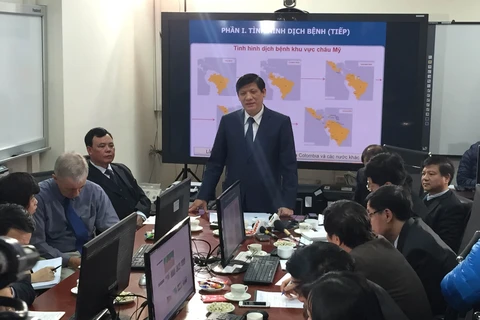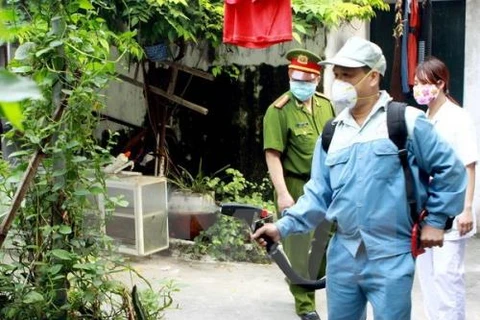Hanoi (VNA) – About 130 Vietnamese and foreign medical experts gathered in Hanoi on June 12 at an international symposium on the management, prevention and control of some diseases caused by Arthropod-borne virus (Arbovirus), any of a group of viruses transmitted by mosquitoes, ticks or other arthropods.
Addressing the event, Deputy Minister of Health Nguyen Thanh Long stressed the complication of epidemics in the world in recent years, adding that 150 out of 530 types ofArbovirushave been found harmful to human and animal, he noted.
Vietnam and other Southeast Asian countries such as Thailand, Laos and Cambodia are among countries vulnerable to Arbovirus, especiallyAedes mosquito-borne diseases such as dengue fever and Zika. Last year, 219 Zika-infected cases were reported in Vietnam, said Long.
The Deputy Minister underscored that the symposium is a chance for scientists to discuss and give national-level recommendations and solutions to deal with dengue fever and Zika.
He called on participants to seek solutions in diagnosis, treatment, supervision and prevention of arthropod vectors, thus researching vaccines against the diseases for the community.
The recommendations will serve as reference for dengue and Zika prevention and control strategies, he said.
Reports at the conference highlighted that dengue fever is the communicable disease with fastest growth in the world. The World Health Organisation, about 2,5 billion people, or 40 percent of the world population are at risk of dengue fever infection, and 1.8 billion of them are in the Asia-Pacific region.
Vietnam and ASEAN countries are in the most vulnerable area to dengue fever. So far, no specialised medicines for the disease have been found, while vaccine against the virus has yet to be used widely.
At the same time, climate change along withthe warmer earth and El Nino, means of transportation, uncontrolled urbanisation as well as migration make dengue fever prevention and control more difficult.
Meanwhile, Zika virus is ravaging the world, sweeping through 82 countries and territories, 13 of which reported human-to-human transmission and 29 recorded microcephaly in infants, and 20 recognised polyradiculonevrites.
Participants also made suggestions on how to apply improvement measures to suit each country, the dengue fever situation in Vietnam and the region, as well as necessary measures to prevent and control Aedes mosquito-borne diseases in the region.-VNA
Addressing the event, Deputy Minister of Health Nguyen Thanh Long stressed the complication of epidemics in the world in recent years, adding that 150 out of 530 types ofArbovirushave been found harmful to human and animal, he noted.
Vietnam and other Southeast Asian countries such as Thailand, Laos and Cambodia are among countries vulnerable to Arbovirus, especiallyAedes mosquito-borne diseases such as dengue fever and Zika. Last year, 219 Zika-infected cases were reported in Vietnam, said Long.
The Deputy Minister underscored that the symposium is a chance for scientists to discuss and give national-level recommendations and solutions to deal with dengue fever and Zika.
He called on participants to seek solutions in diagnosis, treatment, supervision and prevention of arthropod vectors, thus researching vaccines against the diseases for the community.
The recommendations will serve as reference for dengue and Zika prevention and control strategies, he said.
Reports at the conference highlighted that dengue fever is the communicable disease with fastest growth in the world. The World Health Organisation, about 2,5 billion people, or 40 percent of the world population are at risk of dengue fever infection, and 1.8 billion of them are in the Asia-Pacific region.
Vietnam and ASEAN countries are in the most vulnerable area to dengue fever. So far, no specialised medicines for the disease have been found, while vaccine against the virus has yet to be used widely.
At the same time, climate change along withthe warmer earth and El Nino, means of transportation, uncontrolled urbanisation as well as migration make dengue fever prevention and control more difficult.
Meanwhile, Zika virus is ravaging the world, sweeping through 82 countries and territories, 13 of which reported human-to-human transmission and 29 recorded microcephaly in infants, and 20 recognised polyradiculonevrites.
Participants also made suggestions on how to apply improvement measures to suit each country, the dengue fever situation in Vietnam and the region, as well as necessary measures to prevent and control Aedes mosquito-borne diseases in the region.-VNA
VNA























